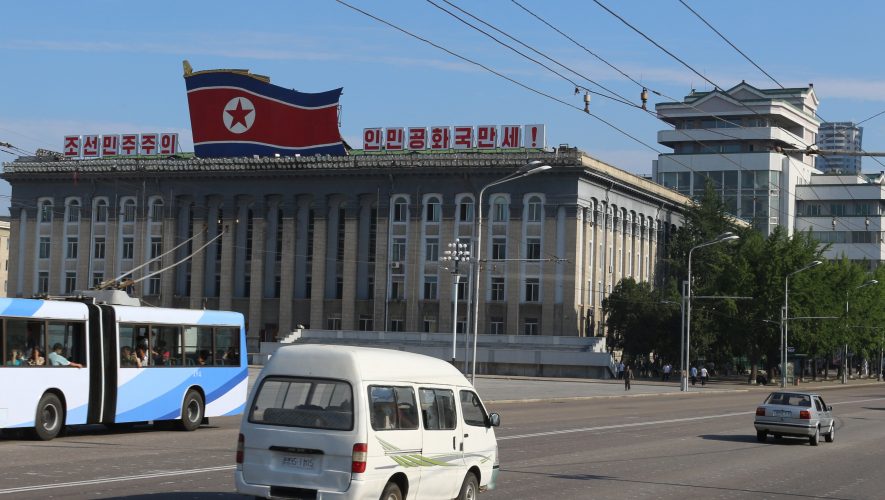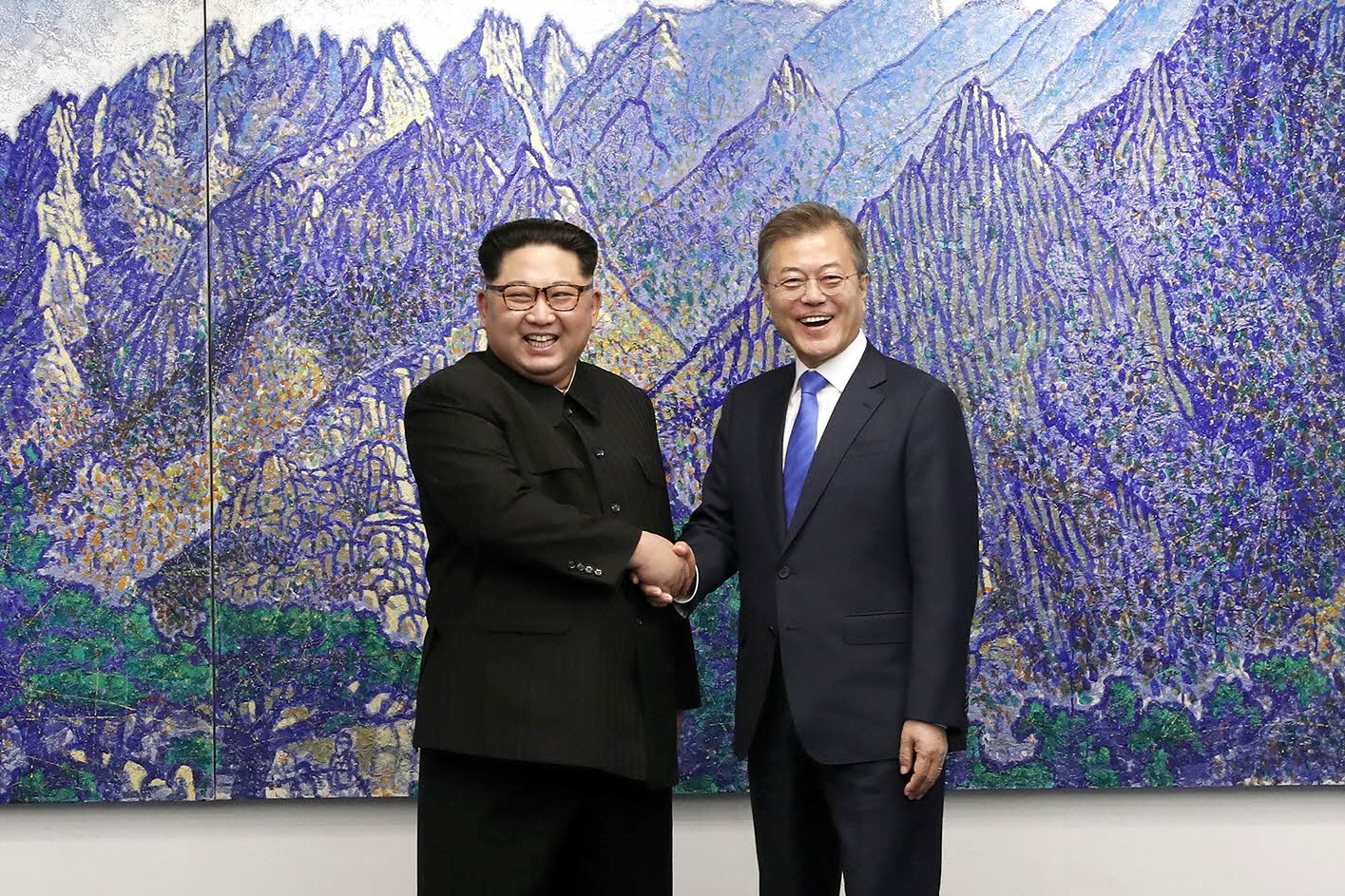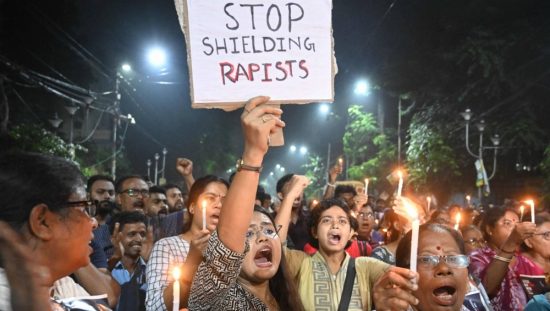On October 3, North Korea launched a missile into the Sea of Japan. It was the eleventh missile test this year, and the first one launched from a submarine. Japan claimed that the missile landed in its exclusive economic zone—an area two hundred nautical miles around the island.
In response, Japan’s Self Defense Force (SDF) conducted a missile defense operations drill with the PAC-3, a surface-to-air missile capable of intercepting short- and medium-range ballistic missiles. It was the first public SDF operations drill in six years.
Japan has no leverage over North Korea, so it relies on the US and President Trump to ensure North Korea ceases production of threatening weapons. So far, North Korean leader Kim Jong-un has met with Trump, South Korean President Moon Jae-in, Chinese President Xi Jinping, and Russian President Vladimir Putin, but has ignored Japanese Prime Minister Shinzo Abe’s public offers to restore diplomatic ties. Japan is falling behind in the North Korea talks, a product of its hawkish policy toward North Korea and its lack of bargaining power. Japan faces tough times without the necessary access to senior officials or policy options available to countries such as the US and China.
In the early 2000s, Japan was nearing a comprehensive deal with North Korea. The Pyongyang Declaration of 2002 announced the countries’ intent to normalize their relations and led to further talks on nuclear weapons and the abduction of Japanese citizens by North Korea in the 1970s and 1980s. Then-Prime Minister Junichiro Koizumi said “ending development of nuclear weapons would lead to [North Korean] economic prosperity,” and in the talks to follow, he would “solve the abduction issue as well.”
At the time, Japan held a bargaining chip that it lacks today. North Korea was in a deep economic crisis, and with mounting economic pressure from the Bush administration, took the chance to make a deal with Japan. In return for economic aid and “protection” from America’s hostile policy, North Korea agreed to provide information on the “missing” abducted Japanese citizens and follow international agreements on nuclear issues.
The same two issues, abduction and nuclear weapons, sank the negotiations. In the case of abduction, upon agreeing to the declaration, Chairman Kim Jong-il apologized for past misconduct and arranged for five abductees to return to Japan for a two-week visit. While this was a show of goodwill from North Korea, several politicians and family members of abductees pointed out that the Japanese government was willing to let past atrocities slide for normalization of relations. They demanded a probe into the other ten abductees including the eight confirmed dead by North Korean officials. In response, Prime Minister Koizumi extended the stay of the five abductees, which prompted North Korea to protest a violation of the agreement. Koizumi had not intended to solve the issues with North Korea through this declaration; his top priority was to resume talks with Pyongyang in hopes of reaching a deal on the issue in the near future. However, public opinion pushed an increasingly unpopular cabinet to reverse its course.
Japan began to question North Korea’s commitment to the declaration, as a clandestine uranium-based nuclear facility in Yongbyun indicated Pyongyang’s desire to reactivate its nuclear program. The declaration clearly mentioned abiding by international agreements, which North Korea violated. Japan’s response was an ultimatum—either comply with international commitments or lose aid and normalization of relations. North Korea responded that unless the US backed off from its hostile policy, it would not shut down its nuclear program. This is understandable from the realist perspective, which says that nation-states act to preserve power and pursue self-interest. In North Korea’s case, the nuclear program ensured protection from the US. In that sense, it would seem rational for North Korea to not concede to Tokyo’s ultimatum. As a result, talks broke down.
Things have not changed much seventeen years later. Japan continues to demand information and the return of abductees. According to government statistics, seventeen abductees are officially accounted for, and another 860 people have gone missing with a high chance of abduction. Prime Minister Abe’s persistence on including the abduction issue in nuclear negotiations has caused tension with the North and with Japan’s allies. North Korea considers Abe’s demand outrageous, as, in their eyes, the “abduction issue has already been resolved” with the apology by Kim Jong-il. Furthermore, North Korea still blames Japan for walking away from the 2002 agreement.
South Korea is not thrilled with Abe’s demand either. South Korea has bitter memories of Japanese treatment of Koreans during WWII. From the issue of comfort women (a euphemism for Korean women forced into Japanese military run-brothels) to the South Korean Supreme Court ruling concerning payment for forced labor during the war (which Japan is appealing to the International Court of Justice), South Korea feels Japan has not provided adequate compensation for its actions. Tokyo believes that much has already been done, including an apology from Prime Minister Abe to the comfort women and a one billion-yen (about nine million dollars) fund to support those women. These tensions inhibit the common goal of deterring North Korea. Better Japan–South Korea relations would strengthen military cooperation and security between the two countries. Without a strong relationship, Japan loses a valuable partner; the countries have an intelligence-sharing agreement which South Korea is abandoning.
Improved relationships between the two countries also help persuade the US to push for Japan and South Korea’s interests. While President Trump has agreed to discuss the abduction matter with Kim Jong-un, this will not be a high priority for him considering his America First policy. At the moment, the President is fixated on concluding the “big deal” and ensuring a historic accomplishment during his tenure. Considering the lack of substantial progress during the Trump–Kim summits, it is safe to assume that negotiations over Japanese abductees aren’t going anywhere anytime soon.
At the moment, North Korea’s trust for the US is low, considering the numerous contradictory statements Trump makes. In a relatively short period, the president went from calling Kim “rocketman” to calling him a “great guy.” Mixed signals lead to distrust and Pyongyang knows Trump could reverse any deal to increase sanctions or start a conflict.
Source: Office of the President of South Korea
This leads to the need for mediators like South Korea’s President Moon Jae-in to facilitate friendly deliberation with Kim. Though North–South talks ended in increased US–North Korea tension—due in part to the joint military exercises between the South and the US—no one had come closer to Kim than Moon. It would be in Japan’s immediate interest to resolve issues with South Korea and cooperate on facilitating further discussions between the US and North Korea. By framing the issue as a coalition of partners instead of bilateral talks between the US and North Korea, both sides can incrementally gain the other’s trust. For that to happen, Japan would first have to resolve its issues with South Korea, which seems unlikely in the near future.
It has also become painfully clear that the abduction issue will have to wait until an agreement on nuclear weapons is made. From 2002 to now, Japan has failed to make a deal with North Korea. It would be wise then, to shift objectives and ensure the US can strike a comprehensive deal with North Korea, even though the abduction issue won’t be addressed.
Independent sanctions will not work. Even if Japan imposes tougher sanctions or lifts them temporarily to incentivize North Korea, Japan can only do so much. Unlike 2002, when Japan was the only place Pyongyang could turn, today, North Korea can rely on China and Russia for support. Additionally, Abe—whose North Korean policy has always been about exerting pressure—cannot back down from support for international pressure on North Korea now. Abe disagreed with the Pyongyang Declaration of 2002, citing the lack of solid North Korean commitment. It would be political suicide for him to turn back now and incentivize aid or the lifting of sanctions.
Japan does not possess the military might the US possesses. America’s capability to destroy North Korea has forced the North to ramp up its nuclear capabilities and negotiate with the US. Without overwhelming military might, Japan has no way of coercing North Korea to negotiate an agreement. In that sense, Japan relies on others for economic and military policies.
So what can be done?
Despite stating his desire to not rush the deal, mounting domestic pressure may force President Trump into making serious concessions to North Korea to seal a deal before the 2020 election. A partial deal may remove long-distance capabilities that threaten the US but allow short- and mid-distance capabilities to remain. Such a situation would mean imminent danger for immediate neighbors Japan and South Korea.
Japan should also move to resolve issues with South Korea, reminding them of the common threat they face. Reports suggest that President Moon is taking a tough stance against Japan to distract from poor economic performance in South Korea. Waiting out his presidency, currently embroiled in multiple scandals involving his justice minister, may lead to a more proactive government. Japanese analysts remember previous President Park Geun-hye’s more pro-Japan (shin-nichi) stance, and hope a new government will follow in those steps. In the meantime, Japan should continue to demonstrate that cooperation has greater advantages than conflict.
Another avenue is the Six-Party Talks. Launched in 2003, they aimed to end North Korea’s nuclear program through negotiations involving China, the US, Japan, North and South Korea, and Russia. Pyongyang agreed to abandon its production of nuclear weapons, then violated the agreement. Like in 2002, this agreement had potential but broke down. The distrust accumulated on both sides makes it difficult to reach an agreement. Japan could attempt to re-spark interest in this agreement and push a conclusive agreement closer to the finish line. Things could get much closer to conclusion if Japan can replicate 2002’s “nowhere else to turn” scenario by persuading the recently enthusiastic China and Russia to cut ties with North Korea, even temporarily.
Such interest from China and Russia to resume such talks provides hope and alarm. In April, a Kremlin spokesman said that there “are no other efficient international mechanisms at the moment.” North Korea’s refusal to commit to denuclearization—and America’s and its allies’ distrust of China and Russia—impede serious talks. In 2013, China requested the US, South Korea, and Japan send their chief nuclear envoys to resume talks. The US asked for a solid commitment to denuclearize as a precondition, which Pyongyang declined. The story is the same every time: the US asks for commitment as a precondition, and North Korea declines. It seems rather wasteful to expect North Korea to commit first.
As the party with the most bargaining power, the US could ask for less and gradually increase their demands. Demanding complete withdrawal from nuclear development is unrealistic considering North Korea’s realist motivations. The US should understand North Korea’s motivations for weapons production and consider incrementally lifting sanctions every time North Korea makes incremental changes to its capabilities. While this would take a long time and require great preparation for negotiations (perhaps a snapback of all sanctions if North Korea doesn’t incrementally give up their capabilities), it would be much more enticing than the current demands.
Success will largely come down to the US. Japan has limited control over how and when an agreement can be reached, but it can initiate several actions to lead to a tangible outcome. Japan can normalize relations with South Korea and, together, push the US for their inclusion in talks; this will likely be met with scrutiny by President Trump, who prefers bilateral deals. They can also pursue the multilateral solution by proposing the Six-Party Talks resume, with the added proposal that demands toward North Korea be lowered or made incremental.
If Japan is to ensure the security of its citizens while pursuing the abduction issue, there are limited choices available. The best the Abe administration can do is to ensure Japan’s inclusion in the North Korea talks and pursue the best course of action for its national security.



